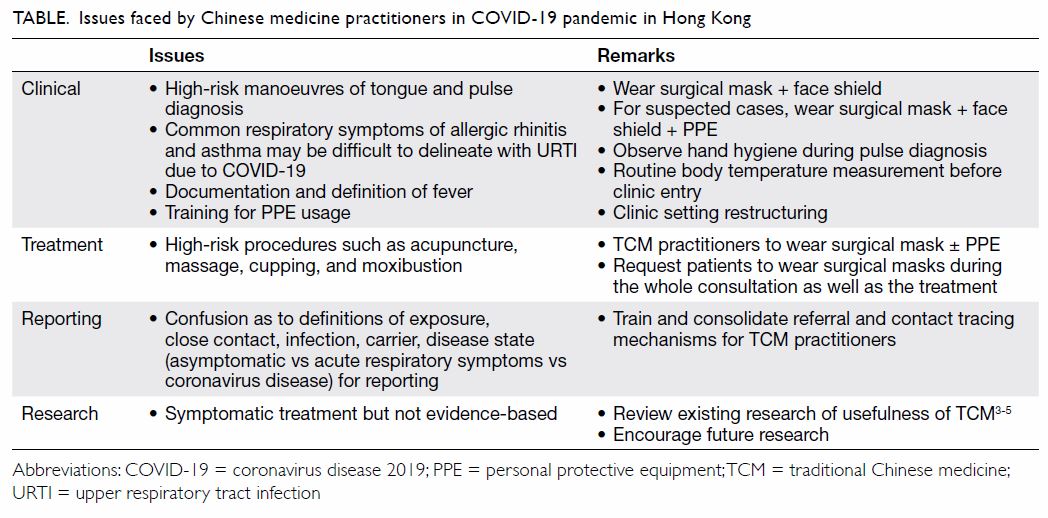Hong Kong Med J 2020 Jun;26(3):268–9 | Epub 5 Jun 2020
Hong Kong Academy of Medicine. CC BY-NC-ND 4.0
LETTER TO THE EDITOR
Roles and challenges of traditional Chinese
medicine in COVID-19 in Hong Kong
WL Lin, PhD, BChinMed1; KL Hon, MB, BS, MD1,2; Karen KY Leung, MB, BS, MRCPCH2; ZX Lin, BSc, PhD1
1 Hong Kong Institute of Integrative Medicine, Faculty of Medicine, The
Chinese University of Hong Kong, Hong Kong
2 Department of Paediatrics and Adolescent Medicine, The Hong Kong
Children’s Hospital, Hong Kong
Corresponding author: Dr KL Hon (ehon@hotmail.com)
To the Editor—To date, there are no reported
outbreaks of coronavirus disease 2019 (COVID-19)
among traditional Chinese medicine (TCM)
practitioners and their patients. Traditional
Chinese medicine is popular globally, especially
in Asian populations such as in Hong Kong. The
concept of integrative medicine is appreciated by
members of the public.1 2 Patients who do not want
to be treated by Western medicine often seek TCM
herbal remedies instead. Practitioners of TCM
are confronted with infection control issues when
they treat patients with mild and vague symptoms.
Some TCM practitioners wear personal protective
equipment, including mask and gown, to protect
themselves during consultations. However, several
routine TCM manoeuvres are high-risk. In TCM,
the tongue is considered to have many relationships
and connections in the body, both to the meridians
and the internal organs. It is therefore considered
essential and important to inspect the tongue for
confirming TCM diagnoses. Pulse diagnosis also
provides TCM practitioners with information about
the health of their patients. In terms of treatment,
many TCM procedures such as acupuncture,
cupping, and moxibustion are considered high-risk.
Various issues are encountered by TCM practitioners
(Table3 4 5).
There are currently over 10 000 TCM
practitioners in Hong Kong, compared with
14 600 doctors of Western medicine. These TCM
practitioners have an important role to contribute in sharing the health burden in the current COVID-19
pandemic, at least in diagnosing and treating mild
cases. The role of TCM is now well established and
the dispensation, storage, and labelling of Chinese
herbal medicines has been regulated since 2003.
In addition, TCM practitioners are regulated and
there are plans for a Chinese Medicine Hospital in
Tseung Kwan O.6 Although there is ongoing research
into TCM treatment of COVID-19, the role of the
discipline is limited and needs deliberation and
recognition.3 4 5
In mainland China, the treatment protocol
for diagnosis and treatment for novel coronavirus
pneumonia has confirmed the integrative role of
TCM in the management of COVID-19.7 Treatment
is offered based on stages of disease, namely, pre-diagnosis,
confirmed (mild, moderate, severe, and
critical), and rehabilitation.7 As with many treatment
strategies worldwide, trials are ongoing and there
has been no current evidence to support or refute
many of the novel treatments, neither in Western
nor TCM.
The current policy of the Hong Kong SAR
government is that all cases are centralised and
managed in the public Hospital Authority system,
exclusive of private sector or TCM partners. It is
recommended that the Hong Kong SAR government
may follow the policy in mainland China to provide
TCM as a complementary treatment for in-patients
with milder disease as part of the healthcare team
responding to COVID-19. In addition, TCM can be offered to patients in the pre-diagnosis and
rehabilitation periods for health promotion. There is
nothing to lose when patients and citizens see that
holistic or integrative medicine is provided by the
public system. When further evidence of efficacy
is established, TCM can be promoted in the other
TCM clinics to serve the public.
The TCM practitioners in Hong Kong have
important roles in treating patients with suspected
COVID-19 in the community.
Author contributions
All authors contributed to the concept of the study, acquisition
and analysis of the data, drafting of the manuscript, and
critical revision of the manuscript for important intellectual
content. All authors had full access to the data, contributed to
the study, approved the final version for publication, and take
responsibility for its accuracy and integrity.
Conflicts of interest
All authors have no conflicts of interest to disclose.
Funding/support
This letter received no specific grant from any funding agency in the public, commercial, or not-for-profit sectors.
References
1. Hon KL, Leung AK. Integrative, integrated medicine but
no integration: Tarnishing steroid and Chinese medicine is
vanity. Hong Kong J Paediatr 2018;23:192-4.
2. Hon KL, Leung AK, Leung TN, Lee VW. Complementary,
alternative and integrative medicine for childhood atopic
dermatitis. Recent Pat Inflamm Allergy Drug Discov
2017;11:114-24. Crossref
3. Ren JL, Zhang AH, Wang XJ. Traditional Chinese
medicine for COVID-19 treatment. Pharmacol Res
2020;155:104743. Crossref
4. Chan KW, Wong VT, Tang SC. COVID-19: An update on
the epidemiological, clinical, preventive and therapeutic
evidence and guidelines of integrative Chinese-Western
medicine for the management of 2019 novel coronavirus
disease. Am J Chin Med 2020;48:737-62. Crossref
5. Gray PE, Belessis Y. The use of Traditional Chinese
Medicines to treat SARS-CoV-2 may cause more harm
than good. Pharmacol Res 2020;156:104776. Crossref
6. Hong Kong SAR government. Prequalification for operation
of Chinese Medicine Hospital in Tseung Kwan O (with
video). 13 September 2019. Available from: https://www.
info.gov.hk/gia/general/201909/13/P2019091200691.htm.
Accessed 4 May 2020.
7. National Health Commission & State Administration of
Traditional Chinese Medicine. Diagnosis and treatment
protocol for novel coronavirus pneumonia; 2020. Available
from: https://www.chinadaily.com.cn/pdf/2020/1.Clinical.
Protocols.for.the.Diagnosis.and.Treatment.of.COVID-19.
V7.pdf. Accessed 4 May 2020.


